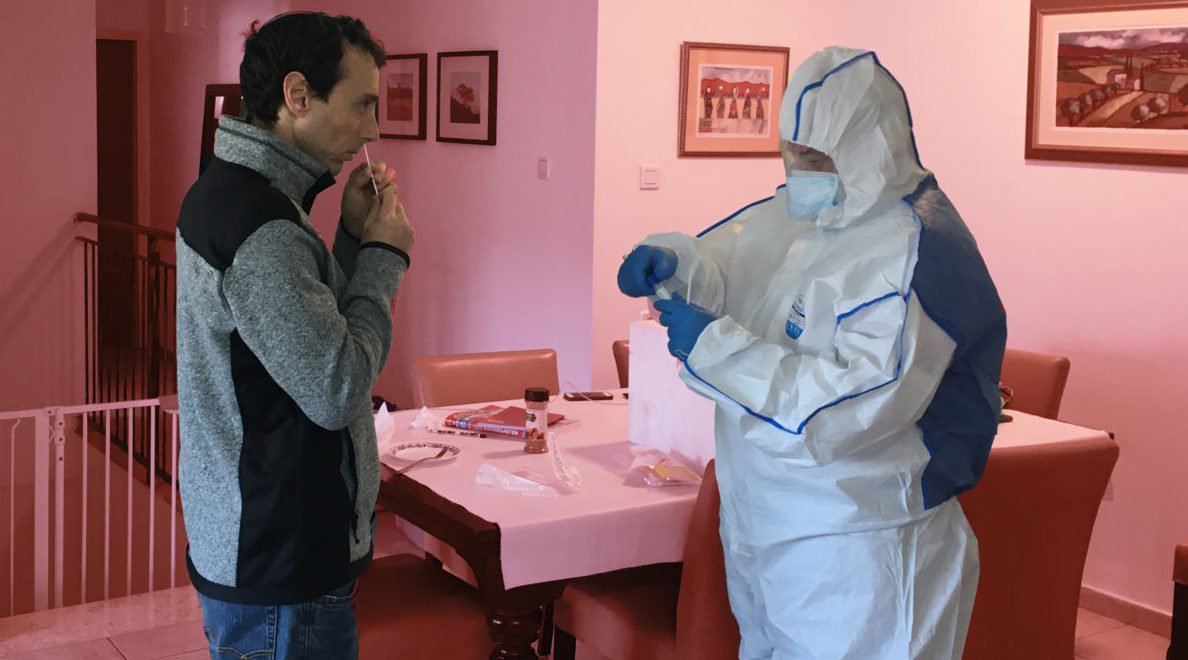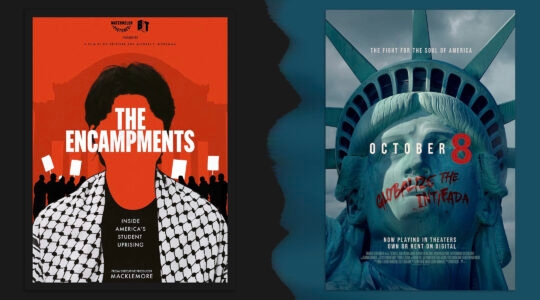MODIIN, Israel (JTA) — When our seventh day of quarantine began with a knock on the door from a guy in a hazmat suit, it was almost a relief finally to have a visitor in the house.
He had come to test my wife and me for coronavirus. My four children eyed the man warily as he unpacked the testing kits at our dining room table.
Barely halfway through a mandatory 14-day quarantine, we were beginning to go a little stir crazy. Our kids, who range in age from 2 to 10, could not attend school or leave home. Our living room was littered with board games, Legos and the remains of half-finished art projects. We were starting to run low on some essentials, and I realized with dismay one day at lunchtime that I somehow had forgotten to change out of my pajamas.
Articles with quarantine recommendations often list things like binge-worthy TV shows, advice for working from home or how to exercise and eat right. They don’t include many tips for keeping four young children occupied or a family of six from going insane.
It wasn’t until after we awoke on our first morning in northern Italy for a much-anticipated, first-ever family ski vacation in Europe that we realized we had landed in the newest coronavirus hot spot.
At first, we tried to shrug off the foreboding news. The epicenter of the outbreak was a three-hour drive away, in the Lombardy region near Milan, and we were in the Dolomite Mountains some 130 miles away. So we slid into our snow pants, piled into our rental car and drove past the unfortunately named Corona Hotel to the base of the gondola that would take us up to the Pinzolo ski area.
That evening, however, as increasingly worrisome reports proliferated about the virus’ rapid spread, we began to grow anxious. By the next night, we had decided to cut our trip short and fly back to Israel, where we’re living this year — mostly to try to avoid a possible quarantine order.
We had a family bat mitzvah scheduled that weekend, and a host of other things we didn’t want to miss, including a national academic achievement awards ceremony honoring our oldest child.
But the morning after we landed, we learned that anybody returning from Italy after midnight the night before would be required to be isolated at home for two weeks. Our flight had landed at 1 a.m.
Within hours, the quarantine was extended retroactively, and within days a growing list of countries joined the mandatory quarantine list: France, Austria, Germany, Switzerland. It seemed only a matter of time before Israel banned flights from the United States, too.
Inside our apartment, however, all this was simply background noise. Our main focus was to get through the next 14 days with no school and no extracurricular activities. Also, no supermarket runs, no walks, no cleaning lady, no Purim and no seeing other people.
There were a few bright spots: I can work from home. And fortunately we have a large backyard, so we wouldn’t have to be cooped up inside all the time.
Incredibly, our friends and community really stepped up to help. My phone buzzed incessantly with messages of sympathy and offers to drop off food, books, games and necessities. Unsolicited cakes and cookies showed up at our doorstep. Students at my children’s school phoned my kids every night on a rotation to ensure that our kids didn’t feel forgotten. Their teachers sent home assignments (much to my kids’ chagrin). At least once a day we got a call from the Israeli health authorities checking in on us.
Our yard is about 15 feet below street level, and nearly every day someone comes to the fence that overlooks it to say hello. We’ve taken to calling it the “Shouting Wall,” named for the Shouting Hill at the Syrian-Israeli border on the Golan Heights, where families separated by the 1967 Six-Day War still communicate with each other by shouting across the border. When our family visits, our kindly next-door neighbors let them traipse through their house to their yard, which abuts ours separated by a low fence. That’s the “Good Fence” — named for the border area where friendly Lebanese used to cross into Israel to shop during Israel’s 18-year occupation of South Lebanon.
One of our first acts under quarantine was to set up an online supermarket order. When the deliveryman arrived with our groceries, I opened the door, stepped back 6 feet and explained the situation.
He quickly backed away, a frightened look on his face.
“It’s all for you!” he said, gesturing to the packages and running for the building stairwell.
“Wait! What about the crates?” I called out.
“Keep them!” he cried, already out of sight. “I have a family! I have children at home!”
“We’re not sick,” I shouted after him. “It’s just that we got back from Italy yesterday! You can have the crates back.”
“I wish you good health. But I’m not coming back! They’re yours!”
The irony of having become objects of pity and charity because of our “misfortune” at having taken a European ski vacation isn’t lost on us. And as we count down the days, trying to keep our nervousness at bay every time someone coughs or has a headache, we’re reading the news about the virus’ spread with growing alarm. Friends and family on distant continents have been subject to quarantine, too.
Even once our quarantine is over, we won’t be in the clear. We’ll be out in the world with the rest of you, at risk of contamination. In some ways, quarantine is a protective cocoon.
Like spending a lot of time with family, it’s a mixed blessing. In any case, I’d like to wish all people around the world good health and a hearty “l’chaim.” Unfortunately, I’ve run out of scotch to do a proper toast.
This story originally appeared on Kveller.
JTA has documented Jewish history in real-time for over a century. Keep our journalism strong by joining us in supporting independent, award-winning reporting.







